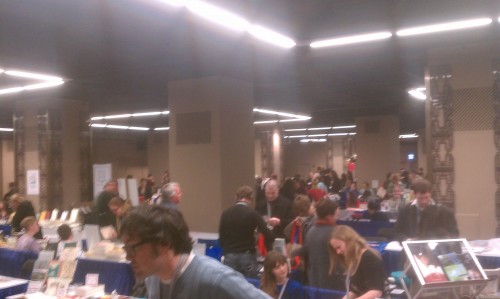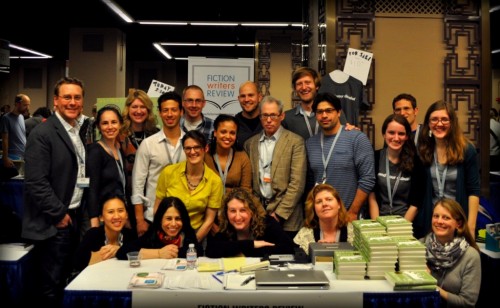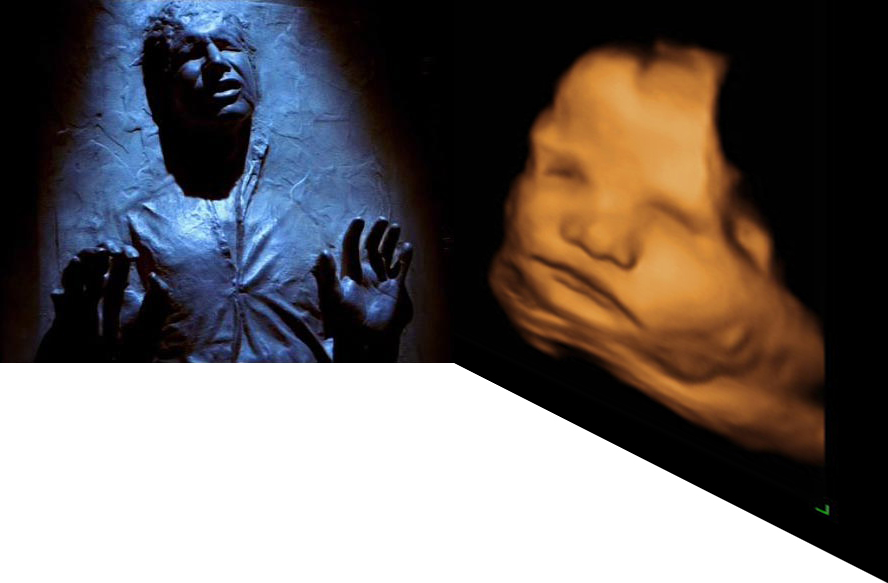Grossness in John Kerry Land (which is already gross) 2013
The bourgeoisie, by the rapid improvement of all instruments of production, by the immensely facilitated means of communication, draws all, even the most barbarian, nations into civilization.
The cheap prices of commodities are the heavy artillery with which it forces the barbarians’ intensely obstinate hatred of foreigners to capitulate.
It compels all nations, on pain of extinction, to adopt the bourgeois mode of production; it compels them to introduce what it calls civilization into their midst, i.e., to become bourgeois themselves. In one word, it creates a world after its own image.
Oh, hey–if you’re in NYC and not too AWHungover, you can go see Joshua Mohr, T. Geronimo Johnson, Adam Tobin, Eric Nelson, and Erika Anderson at the Franklin Park Reading Series tonight. Which is probably my favorite reading series in the world.
More details here.
Spring Breakers
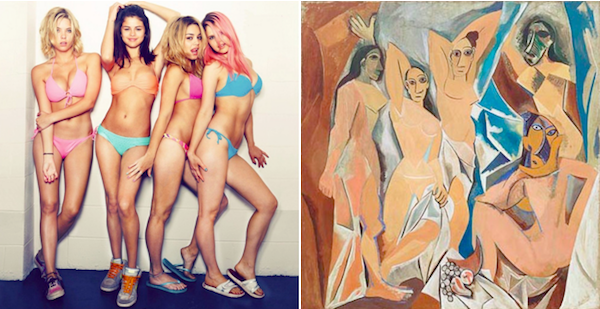
The controversy surrounding Picasso’s Les Demoiselles d’Avignon (1907) lay not so much in its sexual inclination — to which most of Western painting, perhaps even religious, had been dedicated — but in the grotesque and primitive fashion the whores had been rendered. The painting may have been an antagonistic response to a more gentle work (Le bonhuer de vivre, 1906) by Henri Matisse, with whom the former had been in heated rivalry. It shows five prostitutes in a brothel in Barcelona, the still life at the bottom a phallic placeholder. Before racism, Europe simply eroticized Africa, where our artist had gotten tribal masks by which he was noticeably influenced. The offense, then, it seems, was less of a feminist encounter than an Anglo-Saxon European one; simply, we had been unwittingly drawn into bed with dark monsters from another land. As we gleefully await Harmony Korine’s Spring Breakers, which promises to be Girls Gone Wild meets Cops meets every rap video ever made, we are teased with promotional images and film stills. And it would take Selana Gomez — our lady of $4 million net worth; 14,417,325 twitter followers (as of 3/10/13, 11:29 PST); inside whom Justin Bieber first became a man — to swiftly strike a pose that came before her, Madonna, and Marilyn Monroe. An animal, when threatened, will bring their hands to their face; to retract them beyond is to exert trust, the ultimate form of control. To disarm the gaze of its power. Good girl.
Reliquary by Matthew Minicucci
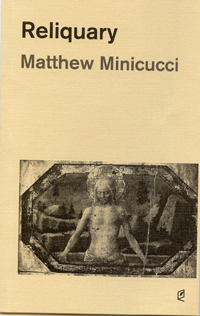 Reliquary
Reliquary
by Matthew Minicucci
Accents Publishing, 2013
21 pages / $5 Buy from Accents Publishing
With a 15th century Jacopo Bellini panel stretched across a nearly gilded cover, pages the color of bone, and vacillating moments of nostalgic faith and analytical skepticism, Matthew Minicucci’s debut chapbook Reliquary feels like it could have been produced by Andy Warhol’s idiosyncratic Catholicism. John Updike, in discussing the 1989 retrospective of Warhol’s work at The Museum of Modern Art, recounts Warhol’s infamous closet Catholicism, his private acts of grace, and his daily attendance at Mass before finding the “Catholic negativity” of “profound hollowness” in Warhol’s canon. Updike’s conclusion appears in his trademark parallelism: “Protestantism, when it fades, leaves behind a fuzzy idealism; Catholicism, a crystalline cynicism.”
Minicucci’s work exudes the skepticism of a mind that still finds faith and ritual beautiful. Such is the tattoo of literary Catholicism: the whispers of youth remain as scars for some, a bright complexion for others. Reliquary is focused on a class of elementary school students led through the fourteen Stations of the Cross by their teacher, Sister Theresa. Two students in particular–the narrator and his friend Chris–return within narratives replete with philosophical and theological asides. Minicucci leads the first poem with an epigraph from Horace, referencing the Promethean act of “making each of us,” the correct precedent for a collection of poems so focused on hands, on faith formation. From the first poem alone, “Jesus is Condemned to Death”: “the perfect curve of marble hands connecting / supple to supplication”; “how Jesus’ index and middle finger separate / from the thumb, point to the sky as Pilate reads”; “Caiaphas stands with his hands outstretched / fingers splayed and downward”; “Sister Theresa sets her hand on my thigh, / presses nails into flesh, pushing / my small knee to the floor.” The focus on hands and palms is to be expected in a Catholic ritualistic milieu: the receipt of the Host, the offering of peace, yet Minicucci focuses on the terrible strength of touch. He must kneel at the first Station in order “to meditate / on each prick of thorn and pull of the lash.” Sister Theresa tells him that “This is what suffering looks like . . . It’s beautiful.”
March 8th, 2013 / 12:00 pm
Triste: Redux. Lines from Lisa Marie Basile’s Triste, Mourning Stories
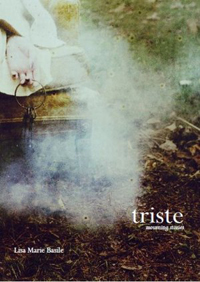 Triste, Mourning Stories
Triste, Mourning Stories
by Lisa Marie Basile
Dancing Girl Press, 2013
30 pages / $7 Buy from Dancing Girl Press
Lisa Marie Basile’s chapbook is a collection of persona poems chronicling the loves and losses of a group of mostly women. Basile’s writing is sexy and intelligent; these characters live and breathe and fuck. She delves deeply into their psyches, making her poems immediate and real, but also accessible. Grief and longing and love turn her characters’ worlds into magic; even little details gain immediacy and meaning. As I read this collection, what stood out was the power of Basile’s images, which are often stark and compelling because of their meaningfulness. Basile captures emotion and meaning beautifully through these images. Here is a sampling of images – one line from each page of the collection:
Triste: Redux. Lines from Lisa Marie Basile’s Triste, Mourning Stories.
You find in-grown wings within my chest cage. Forget the color of wheat alongside the track. She envisions bodies doing the foxtrot after expiration. He is smooth and pretty like ivory, but false like winter. Once I thought I saw you at the market buying plums. You’re always not in the dark, and always not in the light. A small brown mouse runs between my feet.
March 8th, 2013 / 12:00 pm
Heiko Julién’s New Ebook is Out Today

Hey gang, just wanted to spread the word that Heiko Julién‘s 3rd ebook, There Is No Reason for Tigers to Be Beautiful, They Just Are is now online. It’s the first thing from Pop Serial 4 (which is available in print) to be put online. The rest is coming soon, thanks to Chad Redden. Heiko is one of the rare contemporary writers I’m consistently excited about. I vibe with him real hard and maybe you’ll dig him too. An excerpt:
The secret to my Decent Quality of Life?
I spend every moment I’m not eating thinking about the next time I will eat. Creates and maintains tension. This is how I have cultivated bliss within, and yet my greatest strengths are alternately my biggest weaknesses. For instance, I died in a house fire in 2004. Tried to make four toasts in a two-toast toaster.
You need to know: You are in the fight of your life. If you don’t Grow, this fucked up hellscape of a reality we inhabit will ravage your mind/body/soul.
No pressure.
It is no wonder I’ve been a Bad Person and so have you. We’d like to think that’s all in the past now. We are getting older and wiser and less terrified but the stimulus that scares us is getting stronger.
So let’s talk about Bad People: Bad People betray their friends and themselves for no good reason because they have too much fear they’ve chosen to ignore rather than confront. On a seemingly related but unrelated note, this world has betrayed me, so I am commenting on youtube vids, lamenting the death of Good Music. Forsaken by a world that has abandoned me, I wander into my bathtub and drown. It was already filled from a previous bath. (Cold and gross.)
The fact remains that the majority of my youth is gone and I spent a lot of it being upset. Considering suicide as a means of avoiding future work and general discomfort, yet I look at you in your cargo shorts and think, “you are not going to make it, probably.” I think this because I am a survivor and am also into men’s fashion.
Animals are doing all kinds of crazy things to survive and so are you. You bought your daughter a Justin Biebre CD and listened to it to try to feel Good. Incidentally, I still cannot get over the fact that there are animals that live underwater.
You aren’t allowed to commit suicide until your mom has died. These are the rules. I don’t make them. Living is better than not living, even though it’s painful a lot of the time. Just make plans for the future. You don’t even have to do them.
When you are having a serious problem and there’s no one you can talk to about it because they wouldn’t understand, that’s when you’re You.
7 cracks in the spleen cushion
23. Your Spirit Guide to Indie AWP.
1. New lit mag wants your words to glow: ‘pider.
2. Don’t forget about the Diagram Chapbook contest. Lots of $$, hipness, gravitas, and New Michigan Press makes a chapbook so lovely like large meadows/strobe light.
3. CreateSpace versus Lightning Source.
1. Henry Review video Q&A with Sam Lipsyte.
7. These aren’t new but this Lydia Davis interview and this Lydia Davis interview are damn good. I feel both the interviewer and interviewee respected the interview as a genre, as creating something.
10 point bulletin on David Shields
6. Good sex in literature is hard to find.
7. How much money do you take to AWP book fair? I take $100 in cash but not sure if that’s weak or strong or just OK.
Everyone must be at AWP.
For those of us who like theory, what’s the most productive theoretical work you’ve ever read? (Interpret that however you like.)
I don’t know why we call it writing when it is clearly a matter of selecting
A book has neither object nor subject; it is made of variously formed matters, and very different dates and speeds. To attribute the book to a subject is to overlook this working of matters, and the exteriority of their relations. It is to fabricate a beneficent God to explain geological movements. In a book, as in all things, there are lines of articulation or segmentarity, strata and territories; but also lines of flight, movements of deterritorialization and destratification. Comparative rates of flow on these lines produce phenomena of relative slowness and viscosity, or, on the contrary, of acceleration and rupture. All this, lines and measurable speeds, constitutes an assemblage. READ MORE >
On Therapy
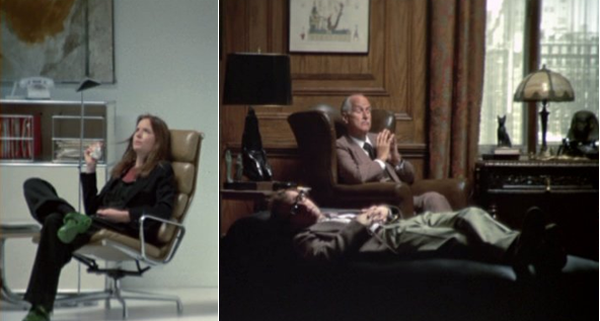
If the split-screen dialog between Woody Allen and Diane Keaton in Annie Hall (1978) seems perfectly timed, of masterful cadence, that is because it was filmed in the same take, the actors next to each other. They built two adjacent therapists’ offices for this. Allen, of course, could have spliced the disparate takes into one, but the “organic,” however inefficient, way of doing this aids the subtly. Alvy is seen in a mahogany-lined office with a Heidegger look-alike — being and time, or rather, time being almost up. Psychotherapists may be called “shrinks” in reference to the Freudian super-ego (conscience, the cause of suffering) one tried to shrink; or, it was first a derisive term from tribal “headshrinkers” who dried the decapitated heads of their enemies. A euphemism for therapist is analyst, the Freudian ghost of anal safely tucked away in the venture. (To see “the rapist” in therapist is, however, your own problem.) Whenever I call my mental health care provider to neurotically reconfirm the breadth of my insurance, an intake counselor pensively — though trained to seem calm, casual — asks me if I feel like either harming myself or others. A phenomenological response would throw us into a two hour conversation, so I just answer No. My therapist is a homosexual Buddhist suspicious that I might be homosexual and Buddhist as well, despite all my efforts to convey otherwise.


